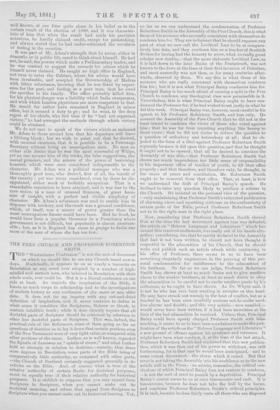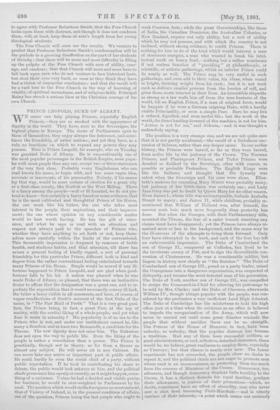THE FREE CHURCH AND PROFESSOR ROBERTSON SMITH.
THE "Westminster Confession" is not the sort of document on which we should like to see any Church based now-a- days. Doctrinally, it appears to us as nearly a travestie on Revelation as any creed ever adopted by a number of high- minded and earnest men, who believed in Revelation with their whole souls, ever could be. But it is a liberal confession on one side at least. As regards the inspiration of the Bible, it leaves as much verge to scholarship and to the investigations, of modelle history as any confession of the same or any older date. It does not do up inquiry with any cut-and-dried definition of inspiration, and it never ventures to define in what sense it considers the Scriptures, Hebrew or Greek, to contain infallible truth ; while it does directly require that all doubtful parts of Scripture should be criticised by reference to other less doubtful parts of Scripture. This was, indeed, the practical rule of the Reformers, some of them going so far on questions of doctrine as to lay it down that certain portions even of the New Testament were of very light value, as compared with other portions of the same. Luther, as is well known, regarded the Epistle of Jameseas an "epistle of straw ;" and what Luther held so strongly in relation to doctrine,—namely, that there were degrees in Revelation, some parts of the Bible being of comparatively little authority, as compared with other parts, —the Church of Scotland certainly suggested generally in its articles on the Bible. And, of course, what is true of the relative authority of certain Books for doctrinal purposes, must be equally true of their relative authority for historical Purposes. It is childish to suppose that you may appeal from Scripture to Scripture, when you cannot make out its doctrinal meaning, and refuse that appeal from Scripture to Scripture when you cannot make out its historical bearing. Yet,
so far as we can understand the condemnation of Professor Robertson Smith in the Assembly of the Free Church, this is what those of his accusers who are really consistent with themselves do condemn him for. They are indignant that he should suppose any part of what we now call the Levitical Law to be of compara- tively late date, and they condemn him as a teacher of Scottish divines for having had the honesty to avow, what no really great scholar now doubts,—that the more elaborate Levitical Law, as it is laid down in the later Books of the Pentateuch, was not known to the Jews at the time of their first invasion of Palestine, and most assuredly was not then, or for many centuries after- wards, observed by them. We say this is what those of his accusers who are really consistent with themselves condemn him for ; but it is not what Principal Rainy condemns him for. Principal Rainy is too much afraid of causing a split in the Free Church to condemn any theological view now permissible in it. Nevertheless, this is what Principal Rainy ought to have con- demned the Professor for, if he had wished to aet justly in what he did this week. Principal Rainy was, however, most careful in his speech to hit Professor Robertson Smith, and him only. He assured the Assembly of the Free Church that he did not in the least intend to condemn the views of those who voted against him ; that ho was far from imputing anything like heresy to those views ; that be did not desire to reduce the question to a question of orthodoxy and heterodoxy at all ; that he ob- jected to the form of a libel against Professor Robertson Smith expressly because it did open this question, and that he thought it ought not to be opened ; that all he desired to convince the Assembly of was this,—that Professor Robertson Smith had shown too much imprudence, too little sense of responsibility in his important office of teacher of youth, to fill that office properly ; and that therefore, and therefore only, be thought, in the cause of peace and conciliation, Mr. Robertson Smith ought to be removed from that office. That, at least, is how we understand the drift of Principal Rainy's speech. Ho declined to raise any question likely to produce a schism in the Church. He insisted on the personal view of the question, —only maintaining that Professor Smith's reiterated publication of alarming views and upsetting criticism on the authenticity of certain parts of the Bible, proved. Professor Robertson Smith not to be the right man in the right place.
Now, considering that Professor Robertson Smith showed tIat at the time the last movement against him was defeated, the article ou "Hebrew Language and Literature" which has caused this renewed excitement, was really out of his hands alto- gether; considering, too, that he openly declared to the Assembly that had it not been written, he should not have thought it respectful to the admonition of his Church, that ho should write and publish such an article afresh while continuing in his office of Professor, there seems to us to have been something singularly ungenerous in the pressing of this per- sonal condemnation for indifference to the admonition of his brethren. So far as we can judge, Professor Robertson Smith has shown at least as much desire not to give needless alarm to the weaker brethren, at least as much desire to obey the admonition to be careful not to excite needless panic by his criticisms, as he ought to have shown. As Dr. Whyte said, it is not be who has ever been wanting in scruples on this head. He may have struck out warmly in the heat of conflict, but as a teacher he has been even morbidly anxious not to excite need- less alarms and doubts ; and this very article,— now assailed,— would never have been written, if it had been unwritten at the time of the last admonition he received. Unless, then, Principal Rainy could have openly charged Professor Smith with false teaching, it seems to us to have been scandalous to make the pub- lication of the article on the " Hebrew Language and Literature " a new ground of offence against his prudence and reticence. It might have been wiser conduct, if, at the time of the last attack, Professor Robertson Smith had explained that this new publica- tion, which it was then out of his power to withdraw, was still forthcoming, for in that case he would have anticipated,—and to some extent discounted,—the storm which it raised. But that error iu not taking the Assembly into his confidence as to the new article still iu the Press,—an article, remember, the critical con- clusions of which Principal Rainy does not venture to condemn, —is not the sort of error to punish by a deprivation. Principal Rainy's course seems to us at once timoursome and rash. It is timoursome, because he does not take the bull by the horns, and condemn Professor Robertson Smith's critical principles. It is rash, because ho does fairly warn all those who are disposed. to agree with Professor Robertson Smith, that the Free Church looks upon them with distrust, and though it does not condemn them, will, at least, keep them at arm's length from her young theological students.
• The Free Church will soon see the results. We venture to predict that Professor Robertson Smith's condemnation will be the prelude to a growing disaffection on the part of her students of divinity ; that there will be more and more difficulty in filling up the pulpits of the Free Church with men of ability, cow- age, and candour ; that that Church will more and more have to fall back upon men who do not venture to face historical facts, but shut their eyes very hard, so soon as they think they have had a vision of unpopular conclusions ; and that the result will be a vast loss to the Free Church in the way of learning, of vitality, of spiritual earnestness, and of religious faith, Principal Rainy has struck a serious blow at the Christian courage of his own Church.



































 Previous page
Previous page